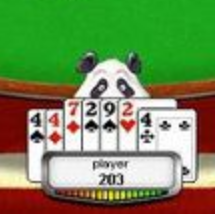Common Situations Ignored By Stud 8 Players

Lately, I have been going back to my old bread and butter game of Stud 8 or better and splashing around in some sit-n-go’s. The old saying of “the more things change, the more they stay the same” still applies strongly to this game. Today, let’s look at a few situations that too many players fail to recognize or act upon.
Ignoring a Paired Door Card
While I commonly preach to beginning Stud High players is that a paired door card many times means a set. Many Stud 8 players tend to ignore this, especially if the door card is a low card.
For example, the bring-in is a deuce and then calls a completion. Many think that maybe the low card started with three to a low. Then on fourth, the deuce catches an open pair. Too often, I see players fail to give this player credit for trips.
If a door card jack caught an open pair, we almost assume he has trips. However, just because the low card came in does not mean he didn’t start with a low pair and a baby.
Back when I first started playing Stud 8 in the early 2000s, the assumption that the deuce was likely three babies carried more weight. However, tournament poker changed how low pairs are played and many players will correctly come in with a low pair and a baby.
Failing to Bet When You Cannot Be Scooped
Long ago, a simple truth of the game was pointed out to me in a random conversation with former WSOP World Champion Greg Raymer. He said, “If I can’t be scooped, I’m going to bet.” So often, players will check a low because they cannot scoop. However, they are missing on a chance to push a player out of the pot.

Bet or not to be when you can’t be scooped? BET!
A prime example was an event I was in at Binion’s several years ago. I have a six low made on fifth street and bet it to the river. My only remaining opponent at the river had a pair of sevens showing.
I bet into him and he said “Well hell. If you can bet into my sevens, I can’t win.” He then folded his hand. I took the pot because of my aggressive betting when I couldn’t be scooped.
Failing to Let Go of Low Draws When Outs are Low
This last tip was one I had to use just the other night. I was dealt A-3-5, one of the best starters you could hope for in the game. A jack straight completed to me. Upon looking around, I saw 2, 4, 4, 6, 6, 3 around the rest of the board. Most of my wheel outs were already gone but I still decided to speculate with the jacks and to see what would happen.
However, the 2nd six decided to raise, and then the original completer decided to three-bet. (Completions do not count as raises remember.) Anyway, it was clear that the six had likely more out I needed as well as the fact it would cost me two more bets to even speculate, so I folded. Honestly, I should have probably folded to begin with considering all the outs that were showing, but the ante’s and bets were still very low so I could gamble one bet.
As you can see, the above situations are not incredibly advanced but many players still tend to ignore them. This is either due to inexperience or the nature of the game. Often, I see these mistakes made by new players to the game or those that like to play the game like Stud High. Avoid the same mistakes in your game and you will improve your results.
